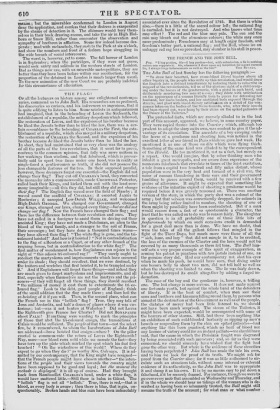THE FLAG!
OFall the lecturers on history among our enlightened contempo- raries, commend us to John Bull. His researches are so profound, his discoveries so curious, and his inferences so ingenious, that it is quite edifying to listen to him. Some sciolists in antiquarianism had imagined, that in the beheadino. of Louts the Sixteenth, the establishment of a republic, the military despotism which followed, the restoration of Louis, and the expulsion of his brother because he liked the Jesuits better than he liked the law, there was a cer- tain resemblance to the beheading of CHARLES the First, the esta- blishment of a republic, which also merged in a military despotism, the restoration of CHARLES the Second, and the expulsion of his brother because he liked the Jesuits better than he liked the law.
In short, they had maintained that so very close was the analogy of all the parts of the two revolutions, that it went far to prove, contrary to the common opinion, that folly was more uniform in her workings than wisdom, and that falsehood, which is prover- bially said to sport two faces under one hood, was in reality as single-faced a gentlewoman as truth, if she did not possess the less changeable features of the two. In their supposed parallel, however, these dreamers forgot one essential—the English did not change their flag ! They cut off CHARLES'S head, they converted the monarchy into a commonwealth, made CROMWELL Protector, called back their Kings, and kicked them out with the least cere- mony imaginable ---81 this they did, but still they did not change their flag ! The 'English flag waved over the field of Naseby- ; it waved round the scaffold of CHARLES; it escorted JAMES to Rochester ; it canopied Low-Dutch WILLIAM, and welcomed High-Dutch GEORGE. We changed our Government, changed our Kings, changed our laws, changed every thing—but we did not change our flag ! Now the French have changed their flag; • and there lies the difference between their revolution and ours. They have not called in a foreigner to assist them in driving out their anointed King ; they have not made a Dutchman, an alien to the blood of the royal family, and a stranger to the soil of France, their sovereign • tad they have done a thousand times worse— they have altered their flag! "The white flag is gone, and the tri- coloured hoisted!" And how is it hoisted? "Not in contradistinction to the flag of a Bourbon or a Capet, or of any other branch of the reigning house, but in contradistinction to the white flag r The lira matter of wonderment is, how Englishmen can rejoice in the sight of "this odious tri-coloured rag ?" "They surely ought to recollect the martyrdoms and imprisonments which have occurred under its shade ; they should recollect, that we were destined, by the traitors and wretches that first hoisted it, to he trampled under it." And if Englishmen will forget these things—and indeed they are much given to forget martyrdoms and imprisonments, and all that, especially when themselves are not the martyrs and the pri- soners—if they will forget all these things, they should recollect "the millions of money it cost them to exterminate the tri- co- loured flag." Look to the debt, good people of England; think of the small addition that the flag made there ; and then hail the re-hoisting of it if you will. Then, in the second place, what can the French see in this "hellish" flag ? True, they may talk of Jena and Austerlitz, and half a dozen of places where it was vic- torious; but—was it not beaten at Waterloo ? Did not Louis the Eighteenth ,oive France her Charter? Did not BONAPARTE shoot PALM? If anything were wanting to mark the principles of those that abet the tri-coloured ensign, the transactions at Calais would be sufficient. The people of that town—not the select few, be it remembered, to whom the lucubrations of John Bull are addressed—have hoisted that ensign—where ? On the pillar erected to commemorate the return of Louts the Eighteenth ! Nay, more—our blood runs cold while we narrate the fact—they have torn up the plate which marked the spot which his foot first touched ! " Oh the wickedness of this world ! Where do they expect to go when they die ?" as worthy Mrs. Cole says. It is ad- mitted bTour contemporary, that the King might have resigned— that the French people might have chosen another—"the- inten- tions of the people and their views towards the country might have been supposed to be good and loyal ; but the moment the cockade is displayed," it is all up of course. Had they brought back from Rambouillet CHARLES'S head, under a white flag, it would have mattered little.—Still there is balm in Gilead, The "hellish" flag is not all "hellish." True, there is red,—that is blood, as every body is aware ; then there is blue, that is gin, un- questionably. Broken heads and blue ruin have been indissolubly associated ever since the Revolution of 1793. But there is white also,—there is a little of the sacred colour left; the national flag is curtailed, but it is not destroyed. And who knows what time may effect? The red and the blue may pale. The sun and the rain may bleach out the obnoxious colours; the white may once more predominate ; Frenchmen may at length enjoy freedom, and freedom's better part, a national flag ; and the Bull, whose ire an unhappy red rag has so provoked, may slumber in his stall in peace.


























 Previous page
Previous page